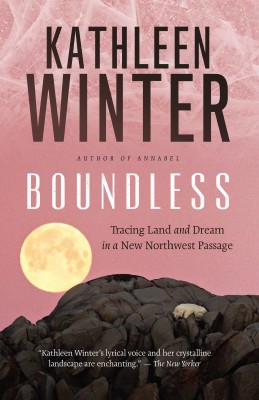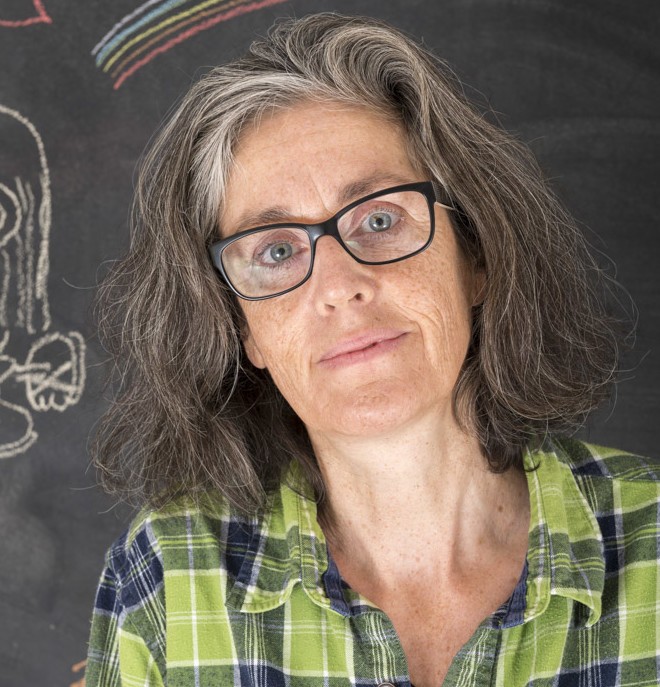“Water, land, wind, sky – these are the only ones with absolute freedom,” remarks Bernadette Dean, an Inuk woman quoted in the epigraph of Boundless, Kathleen Winter’s exquisitely poetic, poignant, and periodically playful account of her 2010 journey across the Northwest Passage.
Boundless is only one of two excellent books released by the bestselling author this fall, and Dean’s words foreshadow a motif that ripples through both. Freedom and its dicey dance partners – loneliness, risk, and consequence – weave seductively through Winter’s collection of short fiction, The Freedom in American Songs. In the title story, the power of song unleashes love between two teenage boys. Yet, when the boys are caught off guard, love is tragically clipped by a culture too narrow for such expression. “My dad always used to quote to me the saying that the price of freedom is eternal vigilance,” comments Winter in our email interview.

The Freedom in American Songs
Kathleen Winter
Biblioasis
$19.95
paper
168pp
978-1-927428-73-3
In Freedom, Winter expands her focus well beyond gender identity to study other triggers of alienation, including ageing, homelessness, and poverty. Stunning beauty intertwines tough emotional truths, while sucker-punch endings leave you reeling. Meanwhile, an oddly alluring hue of loneliness tinges the collection and leaks into her non-fiction title.
“For a writer, loneliness is magnetic,” the author confesses in the opening pages of Boundless. Her relationship with others embodies the ebb and flow of a tide, at times tucking in, connecting with the shore, and then withdrawing back into the unknown. Having moved from England to Newfoundland at the age of eight, she investigates “a state of slight yet constant unbelonging, a rootless unease” leftover from childhood (“when you’ve left a country as a child, you don’t know where you belong”). And yet, she also inherited a sense of adventure from her father. She recalls asking him the reason for their relocation, to which he responded, “‘Freedom’ … as if any fool knew that.” When invited on short notice to journey among strangers across the Northwest Passage, Winter’s immediate response reveals a romantic, independent streak heightened by humour and a healthy thirst for spontaneity: “My bags,” she said, “are already packed.”

Boundless
Tracing Land and Dream in a New Northwest Passage
Kathleen Winter
House of Anansi Press
$29.95
cloth
267pp
978-1-77089-399-3
Winter’s sense of unbelonging is soothed onboard: “On our ship, roots no longer held the key to life: here, wind and water rocked me.” Yet her unique sensitivity makes one wonder if being an experienced outsider contributed to her calling as a writer. Asked if longing is a necessary component of creativity, she replies:
I think there are lots of creative people whose work has a different emotional temperature than mine. I wouldn’t know if other artists need to be, at any point in their lives, outsiders. Sometimes I wonder what would have happened if my father had stayed in England – would I have become something different. But I remember that even there, as a child, I wrote, and knew I was a writer. I think for me the essential spur is a sense of the miraculous – an inability to see anything as ordinary. Ever since I can remember, I’ve marvelled at everyday things. Dogs and trees and the moon. Rivers. Bread. Cranes. There isn’t a day goes by that I don’t marvel at how humans ignore the fact that we cannot create the tiniest spark of life – we can only use and propagate the life that already exists in and around us. We go around acting as if we made the whole show.
Winter’s reverence sparkles throughout Boundless, even when facing beauty that is as heartbreakingly precarious as an ice castle in the sun. While exploring disquieting issues like climate change and the government’s reshaping of indigenous peoples’ lives (“We’d come to see the last great wilderness before it melted and before humans sprinted to the finish line in our collective race to homogenize the planet”), her transcendent pen, infused with starry wonder, never loses its dreamy, emotional pull. Inner and outer worlds overlap in heightened waves of awareness, and throughout her journey the author’s shamanic sensitivity increases, as does her connection to her fellow travellers and to the land. “I felt the land begin to speak louder than it spoke in cities,” she notes while in Dundas Harbour. “The human settlement of the RCMP below the muskoxen’s ridge was an unutterably lonely place and I could hardly bear it, but here with the animals and the tundra plants, I felt no loneliness.”
Assuming such transformative experiences trickle down into everyday life, does Winter continue to hear the land’s wisdom back in bustling Montreal? “Since going North I’ve had to move to a new apartment very close to the riverbank so I can spend more time with trees and the river,” she admits. “I’ve gone North again since I wrote the book and am planning more time away from the city. I’m not sure where this will lead.”
Throughout Boundless, cultures collide, highlighting globalization’s impact. Tradition tangles with commercial products, as does the sacred with the profane. Aaju Peter performs a lamp-lighting ceremony, Winter notes, while “drinking coffee out of a Starbucks travel mug.” Nathan Rogers encourages a group of Inuit teenage girls he meets in Pond Inlet to learn Mongolian throat singing the same way he did – on YouTube. Reading this, one absorbs the absurdity while considering current opportunities to reach out, exchange, and be inspired by other traditions. Will this improvised dance between cultures unify humanity – help us to find a common thread – or further divide us? “That’s something I want to investigate by traveling,” replies Winter. “It’s easy, living in North America,
to feel discouraged by homogenization. One night I had a dream that everyone in the world finally had a pair of Nike sneakers, and I woke up sobbing. But the minute I go out of mainstream Western society I become heartened by how strong and vital real cultures are. Yes, they are oppressed on all sides by impos- ing multinational powers, but they are, in important ways, more powerful.” This past summer, she adds, she visited Labrador’s Torngat Mountains and met with Inuit elders and youth whose “power and intensity” inspired her to take classes in Inuktitut. Winter’s closing comments leave the same impres- sion as the final pages of her out- standing book: her 2010 voyage might well have been the first leg of an even greater, indeed boundless, soul journey. mRb







0 Comments